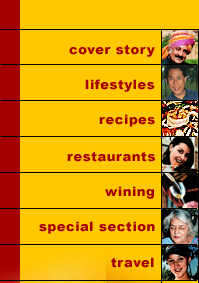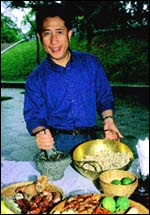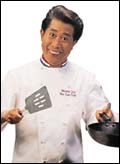


 He Woks! He Talks! Yan Can Cook Too!
He Woks! He Talks! Yan Can Cook Too! FARZANA CONTRACTOR has breakfast with MARTIN YAN, the world famous TV cook and author, and finds he�s a walking, talking encyclopedia on Asian cooking. |
|
Yan gave me the full benefit of his charm over breakfast at the "at-sunrice" culinary centre and pan-Asian cafe in Fort Canning Park, Singapore. I was there with a tableful of other food and wine writers, all of us guests of the Singapore government, invited for a prelude to the World Gourmet Summit and Singapore Food Festival in April.
Yan, I think, is going to be a speaker at this culinary event. He told us all about it, talking like he does on television, quite fluently in English, but with several pauses and an unmistakable Chinese-American accent. My guide informed me that Yan was a highly respected food and restaurant consultant in Singapore, a certified master chef, and he also enjoyed the distinction of being a teacher and author. "He's big!" she whispered in awe.
I was hoping that Yan would be cooking breakfast for us, but he was not. Instead, "at-sunrice" laid out the food. Vietnamese Lemongrass Chicken with Sticky Rice, Mieng Kum, an appetiser made of Singapore's Bai Chaa Phluu plant, and Laksa, rice noodles in a rich and spicy coconut soup. It could have been lunch! I had eaten better breakfasts in Singapore, and worse. But never with such a distinguished companion. I metioned this to Yan, and he flashed his teeth happily. "Why didn't you cook?" I complained. And he replied: "I don't want to give the impression that I'm even remotely the best chef. I left China for the US because there are so many good chefs there. I couldn't get a job!"
He is a small man, almost petite, and not built in the classic roly-poly mould of the great master chefs of the world. But blessed with a lightning-quick cleaver to bone a whole chicken in 30 seconds and mince vegetables with the precision of a heart surgeon, while explaining the secrets of preparing Chinese food at home. The cleaver and the wok are his favourite tools of trade. He said when he travelled, he carried two woks with him. "One electric, one stovetop. Sometimes I go to places where I am not allowed to use flame, so I have to use an electric wok. My suitcase always raises eyebrows when it passes through airport x-ray machines!"
Yan is a bit of a joker. There were no cameras trained on him at the breakfast table, but yet he was as loquacious a showman as he is on television. "I pepper my half-hour cooking lessons with plenty of puns and humour... because the worst thing you can do is intimidate an audience," he said in his best television manner. I agreed with him. I remembered his shows on BBC in the mid-Nineties, they were as entertaining as they were educational. His cooking artistry and teaching skill were as unique as his brand of humour. And moreover, his dishes were always surprisingly easy to make. When he signed off with the encouraging declaration, "If Yan can cook, so can you!", I think women around the world believed him. I know I did.
"But I really don't think I have a sense of humour," Yan protested now, confusing me. "I'm not trying to be a comedian. Mine is a cooking show, not a comedy. I'm not very funny. I'm pretty boring, actually. But I have fun because I enjoy what I'm doing. I believe if you teach people with a sense of humour, with something amusing, they will pay more attention and learn more.
That's why my show is so popular. When it first aired, people looked at it as fun and games. Now they're begining to realise the things I cook are very healthy too!" In his new series, Yan blends the tastes and culinary traditions of East and West in dishes from Asia, but cuts back on humour. He explained: "I want people to laugh, but I want them to take me seriously too, to see me as a professional... so humour for the first ten minutes only!"
Born in Guangzhou, China, Yan always possessed a passion for cooking. His formal introduction to the culinary world started at 13 (he's 47 today) when he began his first apprenticeship for a Hong Kong restaurant. "I went to school during the day and worked in the restaurant in the evenings and on weekends. I got room, board, and $25 a month. When the last customers left at night, I would lay a plank across the top of a booth for my bed. It was hard work, but I learned a lot." He then earned a diploma from the Overseas Institute of Cookery in Hong Kong, travelled to Canada, then to the United States, where he taught Chinese cooking at the University of California before earning an M.S. in food science from there.
His big break came in 1978 with the cookery show Yan Can Cook. At a time when fat was not looked upon as a dietary culprit, Yan's dishes on the show centred around the use of fresh vegetables and meats and low-fat cooking methods. "All the cooking I do is lean. Most of the dishes I prepare average about 17 to 23 per cent of their calories from fat." Here he revealed the importance of wok cooking. "Stir-fry comprises 70 per cent of technique in everyday Chinese cooking. Practise maintaining high temperature and short-time cooking. If it's not hot enough, the meat will not sear in the juice and get dry. And the vegetables would cook much longer than necessary and get overcooked."
Yan is dedicated to dispelling the mysteries of Chinese and Asian cooking. He has made it his life's mission to research original Chinese recipes, and develop them, so as to demystify the cooking and popularise it around the world. Now he discussed changing lifestyles in China at the breakfast table with me. "A country that never liked cheese, suddenly has Pizza Huts and Kentucky Fried Chicken all over the place, and their food is all cheese," he said.
Likewise, China had no history of matching food with wine. True, Chinese cooking was an art. It was also about contrast and harmony. Like yin and yang. You had light and rich food, bright and light colours, stir-fry and deep-fry. And if this was matched with the Western culture of drinking wine, perhaps something might come out of it.
He regretted he had been living in the US for so long now, his food was not traditionally Chinese. It was more contemporary. "But I don't change basic philosophy or basic preparation techniques. The way I cut, the way I marinate, the way I cook, it's still very much the way they did it for thousands of years," he explained.
"I always prepare a dish the way I was trained, the way my mother did it, the only difference is I'm using ingredients that are never available in China. When I was in China, I never heard of asparagus and broccoli. But go to any Chinese restaurant now and what do you see on the menu? Beef and broccoli. Chicken with asparagus and black bean sauce. The sauce is Chinese. And the flavour, the way the ingredients are cut, the meat marinated and the food presented, is also very Chinese. That is what makes the cuisine, not the new ingredient introduced."
Somebody wanted to know whether they ate dog in China, and Yan laughed delightedly. "In many parts of the world, food is so scarce that it becomes precious. People make use of whatever is available... and that may seem to be very uncivilised. In Beijing they eat deep-fried crispy scorpions. They also pan-fry ants. As long as ingredients are of good quality and fresh, and you prepare properly, it doesn't matter what you use - beef, chicken or shrimp. It's good food." His own favourite food, Yan said, was plain, steamed, truly fresh fish, with green onion and cilantro and ginger and a touch of soy sauce.
"Who does the cooking at home, you or the wife," I asked, curious to know the Yan family secrets. "A cooking professional should not be put on a pedestal," Yan replied. "I get up every morning very excited about work. I am a hands-on kind of guy. I put on my apron and get going. If I start hiring people to run my life I will become a commodity. My wife, Susan, manages my office as well as some of my projects. We work together as a team. And whenever I am at home, I cook dinner. It is always very simple."
Now the great Chinese master chef let me into a secret. "My kids love Italian food, so I have to cook it for them," Yan revealed, grinning comically. "Chinese and Italian foods are so similar in many ways. Not so much in the flavours, as the basic ingredients and preparation methods. In both cultures, food is to be shared and enjoyed. One-dish meals are popular in both cuisines. We both serve pasta or rice with fresh vegetables, a little meat or fish, with sauce over them. I make it interesting for the kids by putting a little Asian spin on the Italian-style dishes. They're growing up eating fusion cooking!"
I had one final question for him before we left the breakfast table. He was on the road 10 months in a year with Yan Can Cook, and also planning fund-raisers, espousing programmes, conducting trade shows, giving product demonstrations, attending sales meetings, delivering lectures, appearing on television and radio, writing books. Where did he get the energy from? "I never look at myself as being in the entertainment business," Yan replied. "I look at myself as a cooking teacher who loves to eat, loves to cook. I'm having a good time." I could see he was. And Yan got up to go, offering to take with him my used and dirty plate.
|

Home Page
About the mag
Subscribe
Advertise
Contact Us
